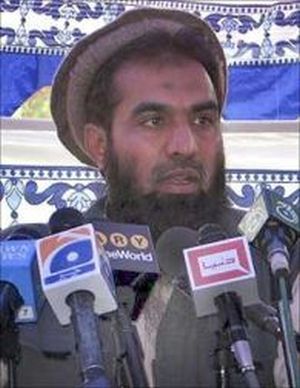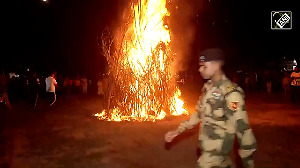 Pakistan on Thursday said it was serious in the trial of Zaki-ur Rehman Lakhvi and in bringing the perpetrators of the 2008 Mumbai terror attack to justice even as it rejected reports the US had shared any "critical" evidence with it about the mastermind.
Pakistan on Thursday said it was serious in the trial of Zaki-ur Rehman Lakhvi and in bringing the perpetrators of the 2008 Mumbai terror attack to justice even as it rejected reports the US had shared any "critical" evidence with it about the mastermind.
Foreign Office spokesperson Tasnim Aslam during a weekly briefing rejected reports that Pakistan was not serious in Lakhvi's trial.
"Court proceedings are continuing and we expect the law to take its course in the case of Zaki-ur Rahman Lakhvi...Pakistan's commitment to bring the perpetrators of Mumbai Attack (to justice) should not be questioned," she said.
She said the delay in the trial was not due to Pakistan but because the crime took place in another country and the prosecution needed access to eyewitnesses and other evidence in order to proceed in the case.
Pakistan's Judicial Commission could not get access to the main accused and it took the Indian government over four years to agree to the recording of the 4 prosecution witnesses, she said.
“The delay complicated the trial and created difficulties for the prosecution. These constraints notwithstanding, the trial is underway,” Aslam said.
She rejected reports that the US recently had shared some "critical evidence" about Lakhvi with Pakistan.
The spokesperson also talked about the 2007 Samjhauta Express attack in which many Pakistanis were killed and said India has not shared the related findings with Pakistan.
"Despite assurances at the highest level, the Indian side is yet to start a formal trial to bring the perpetrators to justice. Despite evidence and confession of Swami Aseemanand who also provided evidence of involvement of Indian armed forces officers in the Samjhauta terrorist attack, trial has not started," she said.
Aslam said there should not be different standards for different countries in combating terrorism.
"The lives of Pakistanis killed in terrorism are as precious as the lives of citizens of any other country," she said.
Aslam said terrorism was a threat to the global community and to this region and cooperation and concerted efforts are needed to fight it.











 © 2025
© 2025